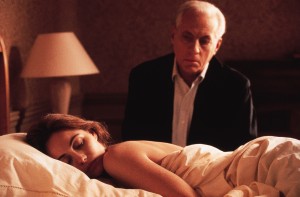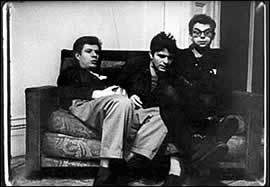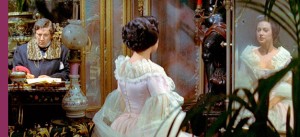Written for the Kino Lorber Blu-Ray of this film, released in September 2019. — J.R.

Let me start with a confession about the ways that both fashion and one’s age can affect one’s taste. My first acquaintance with writer-director Claude Sautet (1924-2000) came when I was a hippie and cinephile in my late 20s living in Paris in the early ‘70s, a follower of Cahiers du Cinéma in my viewing preferences more than a follower of its leading monthly competitor, Positif, although I usually purchased both magazines. Back then, Sautet’s The Things of Life (1970), and César and Rosalie (1972) struck me as the epitome of well-crafted, genteel yuppie navel gazing, especially for what I took to be their uncritical embrace of the upper middle class. He was clearly a skilled director of actors, but the overall whiff of his milieu seemed complacent to a fault. Consequently, I steered clear of his 1974 Vincent, Francois, Paul and the Others, one of his biggest hits, and when, five years later, back in the U.S., I wrote an article about Chantal Akerman, Jean-Luc Godard, and the team of Jean-Marie Straub and Danièle Huillet for the mainstream and middlebrow American Film, I was mortified when my editors condescendingly changed my title to “Jean-Luc, Chantal, Danièle, Jean-Marie, and the Others,” which led Akerman herself to reproach me for the piece, assuming that I’d dreamed up that title myself. Read more
Commissioned by MUBI Notebook for November 18, 2019. — J.R.

“How much of this film is composed, and how much is improvised?” The obvious question posed by Robert Frank’s first film (coauthored by painter Alfred Leslie), Pull My Daisy (1959), is also posed, sometimes less obviously, by the authored and coauthored Frank films that follow it—an unwieldy filmography that has on occasion become even harder to access because of the unwieldy ways it was financed or put together. (Most notoriously, Cocksucker Blues, produced by the Rolling Stones to chronicle their own 1972 North American tour, has been banned by them from most venues.) To wonder whether they’re Frank or frank is arguably another way of interrogating their relative degrees of sincerity or subterfuge, non-fiction or fiction, single or collective authorship. And it’s ultimately our call whether any given shot in a Frank film corresponds to a declarative statement or a question—something that might also apply to his better known, more celebrated, and noncollaborative still photography. “After seeing these pictures,” wrote Jack Kerouac of The Americans, “you end up finally not knowing any more whether a jukebox is sadder than a coffin.” But whereas most or all the Frank photographs I’ve seen are recognizably his, each successive Frank film is a reinvention of what the art of film might consist of. Read more
From the Autumn 2019 Cinema Scope (https://cinema-scope.com/columns/global-discoveries-on-dvd-compulsively-yours-including-a-few-real-life-confessions-admissions/). — J.R.
Although I’m no longer a member of Il Cinema Ritrovato’s DVD jury, two other visitors to Bologna in June who are familiar with this column presented me with new DVDs:

1. A year ago in this column, while celebrating Edition Filmmuseum’s PAL DVD release of Max Ophüls’ Liebelei (1933) and the German version of his 1955 Lola Montez (which I misspelled as Lola Montès, the title of the French version), I registered the minor complaint that the “bilingual” booklet, which I hoped would explain how and why Marcel Ophüls finally withdrew his obscure objection to the German version (which I regard as the best version, above all for its colours), was only in German. It turns out that this lapse was just a printing error, and the corrected bilingual version of this two-disc set is now available. (Furthermore, I gather that the withdrawn objections of Ophüls fils were basically a matter of money.) Combined with the recent and long-overdue publication of François Truffaut’s Chronique d’Arts Spectacles 1954-1958 — Gallimard’s collection of his texts for a prominent right-wing weekly that, in the opinion of some French cinephiles, are superior to his reviews for Cahiers du Cinéma, and which includes some rapturous writing about Lola Montès (the French version), including praise for its “[un]natural” colours — this makes me want to re-see the German version yet again. Read more



